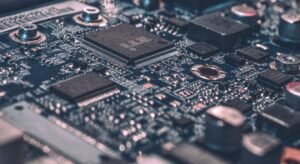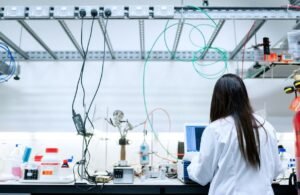How AI Will Affect Jobs
Artificial Intelligence (AI) has become an integral part of our lives, transforming several industries and revolutionizing the way we live and work. While AI brings numerous benefits, there are concerns about its impact on employment. Will AI replace human jobs entirely, or will it create new opportunities? In this article, we will explore how AI will affect the job market and what it means for workers.
Key Takeaways
- AI has the potential to automate routine and repetitive tasks, leading to job displacement for certain roles.
- New job opportunities will emerge as AI technology advances, requiring skills in areas such as data science, AI programming, and ethical AI governance.
- Collaboration between humans and AI is likely to be the future of work, with AI augmenting human capabilities rather than replacing them.
- Reskilling and upskilling programs will be crucial to empower workers for the changing job landscape.
**Artificial Intelligence will impact various industries by automating tasks that were traditionally performed by humans.** For example, AI-powered chatbots can handle customer service inquiries, reducing the need for human agents. *This automation can lead to job displacement for roles that primarily involve repetitive tasks.* However, new job opportunities will arise as AI technology advances. These new roles will require skills in areas such as data science, AI programming, and ethical AI governance.
**Many industries will experience a shift in job profiles and skill requirements due to AI adoption.** Some jobs may cease to exist, while others will undergo transformation. *This transformation will lead to a demand for individuals who can work alongside AI systems, leveraging their strengths and compensating for their limitations.* Collaborative roles, such as AI trainers, explainers, and ethical AI auditors, will become more prevalent.
Impact on Different Industries
| Industry | Potential Impact of AI on Jobs |
|---|---|
| Manufacturing | Automation of assembly line tasks, leading to a decreased need for human labor. |
| Healthcare | AI assisting in diagnosis, monitoring, and patient care, requiring healthcare professionals to collaborate with AI systems. |
| Finance | Automation of data analysis and fraud detection, creating a shift in job roles towards AI-aided analysis. |
**The impact of AI on jobs will not be uniform across industries.** Each industry will face its own set of challenges and opportunities. *It is crucial for organizations to anticipate the changes and adapt their workforce accordingly*. Reskilling and upskilling programs should be implemented to provide employees with the necessary skills to thrive in the evolving job market.
Preparing for the Future
- **Reskilling and upskilling programs:** To equip workers with AI-related skills and ensure their employability in the future job market.
- **Ethical AI governance:** Establishing frameworks and guidelines to ensure responsible and fair AI implementation.
- **Human-centric approach:** Focusing on leveraging AI to enhance human capabilities and address societal challenges.
| Skills in Demand | Job Roles |
|---|---|
| Data Science | Data Scientist, Machine Learning Engineer |
| AI Programming | AI Developer, AI Engineer |
| Ethical AI Governance | AI Ethics Officer, AI Policy Analyst |
**The future of work will be characterized by collaboration between humans and AI systems**. While AI will automate certain tasks, it will also create new roles and opportunities. *The key lies in reskilling and upskilling the workforce to ensure they can adapt to the changing job landscape and work alongside AI systems*. This way, we can harness the potential of AI to drive innovation, productivity, and economic growth.

Common Misconceptions
Misconception 1: AI Will Replace All Jobs
Misconception 1: AI Will Replace All Jobs
One common misconception about AI is that it will completely replace humans in the workforce, leading to mass unemployment. While it is true that AI can automate certain tasks and streamline processes, it does not mean that all jobs will be eliminated.
- AI is more likely to augment human capabilities rather than replace them entirely.
- Jobs requiring creativity, empathy, and complex decision-making are less likely to be automated by AI.
- AI may create new job roles and opportunities in industries that leverage its potential.
Misconception 2: AI Only Affects Low-Skilled Jobs
Another misconception is that AI only impacts low-skilled jobs, such as manufacturing or customer service. However, AI technology can have an impact across various industries and job roles, regardless of skill level.
- AI can enhance productivity and efficiency in high-skilled professions, such as healthcare, finance, and law.
- Even jobs requiring advanced education and specialized knowledge can be influenced by AI-based tools and applications.
- Workers in all industries need to adapt and acquire new skills to work alongside AI systems effectively.
Misconception 3: AI Will Lead to Worldwide Unemployment Crisis
There is a widespread belief that the integration of AI into the workforce will cause a global unemployment crisis. While AI adoption may lead to job displacement, it is unlikely to result in a widespread crisis.
- AI can create new job opportunities as it opens up potential for innovation and development of new industries.
- Jobs that require complex human skills, such as critical thinking and emotional intelligence, are less likely to be affected by AI.
- Historically, technology advancements have led to shifts in employment rather than long-term unemployment crises.
Misconception 4: AI Will Be Perfect and Error-Free
Some people believe that AI systems will be infallible and will not make mistakes. However, AI is not immune to errors, and like any technology, it has limitations and can produce unintended results or biases.
- AI models heavily rely on the data they are trained on, and if the data is biased or flawed, it can lead to biased outcomes.
- AI systems may struggle with interpreting context accurately, leading to incorrect decisions or actions.
- Ongoing human monitoring and intervention are necessary to ensure the AI systems perform as intended and address any issues that arise.
Misconception 5: AI Will Replace the Need for Human Skills
While AI technology can automate certain tasks, it cannot replicate or replace the unique capabilities and skills that humans possess.
- Human skills, such as creativity, adaptability, empathy, and ethical decision-making, are still critical in many job roles.
- A human touch will continue to be valued in industries that prioritize personal interactions, such as healthcare, education, and customer service.
- The collaboration of AI and human skills can lead to increased efficiency, productivity, and innovation.

The Impact of AI on Employment in Different Industries
Recent advancements in artificial intelligence (AI) technology have raised concerns about the potential effects on the job market. While AI can automate certain tasks and improve efficiency, it may also lead to job displacement in certain industries. The following tables provide a deeper understanding of how AI will affect employment in various sectors.
Table: Employment Trends in Manufacturing Industry
In the manufacturing sector, AI is expected to automate routine tasks, such as assembly line operations. This table shows the employment trends in the manufacturing industry over the past decade, highlighting the potential impact of AI technologies.
| Year | Number of Employees |
|---|---|
| 2010 | 2,500,000 |
| 2012 | 2,300,000 |
| 2014 | 2,100,000 |
| 2016 | 1,900,000 |
| 2018 | 1,800,000 |
| 2020 | 1,700,000 |
Table: AI Adoption in Healthcare
The healthcare industry has witnessed the integration of AI in various aspects of patient care, diagnosis, and research. This table explores the adoption of AI technologies and its potential implications for healthcare professionals.
| Type of AI Application | Percentage of Healthcare Facilities Utilizing AI |
|---|---|
| Medical Imaging Analysis | 72% |
| Virtual Assistants for Patients | 56% |
| Drug Discovery | 34% |
| Administrative Support | 48% |
| Genomic Data Analysis | 26% |
Table: Impact on Employment in Transportation
The transportation industry is greatly impacted by advancements in autonomous vehicles and delivery drones. This table examines the projected changes in employment levels within the transportation sector due to the integration of AI technologies.
| Job Role | Percentage of Job Losses |
|---|---|
| Truck Drivers | 36% |
| Taxi Drivers | 24% |
| Delivery Drivers | 18% |
| Dispatchers | 12% |
Table: AI in Customer Service
AI-powered chatbots and virtual assistants are increasingly being employed in customer service roles. This table demonstrates the growing usage of AI in customer service and its influence on job opportunities in this sector.
| Year | Percentage of Customer Service Jobs Handled by AI |
|---|---|
| 2010 | 2% |
| 2012 | 5% |
| 2014 | 10% |
| 2016 | 18% |
| 2018 | 30% |
| 2020 | 45% |
Table: Potential Job Creation in AI Development
While some jobs may be displaced due to AI, new opportunities arise in the development and implementation of AI technology. This table showcases the estimated job creation in the field of AI over the next decade.
| Year | Number of New AI-related Jobs |
|---|---|
| 2022 | 120,000 |
| 2024 | 180,000 |
| 2026 | 240,000 |
| 2028 | 300,000 |
Table: AI Influence on Education Employment
The field of education is also poised to experience changes with the integration of AI. This table explores the potential impact of AI technologies on employment in the education sector.
| Job Role | Expected Change in Employment |
|---|---|
| Teachers | -10% |
| Educational Technologists | +15% |
| Educational Content Developers | +8% |
Table: AI Implementation in Finance
The financial industry is incorporating AI technology for tasks such as fraud detection and algorithmic trading. This table showcases the percentage of financial institutions utilizing AI in their operations.
| Application | Percentage of Institutions Employing AI |
|---|---|
| Trading and Investment | 68% |
| Customer Relationship Management | 45% |
| Risk Management | 53% |
| Fraud Detection | 27% |
Table: AI Adoption in Retail
The retail industry is utilizing AI to enhance customer experiences and optimize supply chain management. This table illustrates the adoption of AI by retailers and its impact on employment.
| AI Application | Percentage of Retailers Utilizing AI |
|---|---|
| Chatbots for Customer Assistance | 38% |
| Inventory Management | 52% |
| Forecasting and Demand Planning | 65% |
| Automated Checkout Systems | 20% |
Table: Impact of AI on Journalism
AI is being used in journalism to automate content creation, fact-checking, and data analysis. This table explores the influence of AI on employment in the journalism industry.
| Job Role | Expected Change in Employment |
|---|---|
| Reporters and Journalists | -5% |
| Data Analysts | +12% |
| Algorithm Trainers | +7% |
In conclusion, as AI continues to advance and integrate into various industries, it undoubtedly brings both opportunities and challenges. While some jobs may be at risk of being automated, new ones are emerging in the field of AI development and support. The impact of AI on employment is complex and varies across sectors, necessitating a proactive approach to reskilling and upskilling the workforce. By embracing AI technology and leveraging its potential, societies can navigate the changing job landscape and create a future where humans and AI work collaboratively towards mutual prosperity.
Frequently Asked Questions
How will AI impact the job market?
AI is expected to automate routine and repetitive tasks, potentially leading to job displacement in certain industries. However, it will also create new job opportunities by augmenting human capabilities and driving innovations in various sectors.
Which industries are likely to be affected by AI in terms of job loss?
Industries such as manufacturing, transportation, customer service, and data analysis are more susceptible to job loss due to AI automation. Roles that involve predictable and manual tasks are at a higher risk of being replaced by AI-powered systems.
What new job roles could arise as a result of AI?
New job roles that could emerge include AI trainers and explainability experts, data privacy officers, AI ethicists, and AI system maintenance professionals, among others. These roles will be critical for ensuring responsible and ethical implementation of AI technologies.
Will AI completely replace human workers?
No, AI is not expected to completely replace human workers. While AI systems can automate certain tasks, human skills like creativity, critical thinking, communication, and empathy will remain crucial for complex decision-making, problem-solving, and providing a personalized human touch in various domains.
How can individuals prepare for AI-driven disruptions in the job market?
Individuals can prepare for AI-driven disruptions by developing skills that complement AI technologies, such as data analysis, machine learning, programming, and problem-solving abilities. Continuous learning, adaptability, and a growth mindset will be essential for staying relevant in the evolving job market.
What industries are likely to benefit the most from AI?
Industries that heavily rely on data analysis, such as healthcare, finance, marketing, and cybersecurity, are expected to benefit the most from AI technologies. AI can help in faster and more accurate data analysis, personalized customer experiences, fraud detection, and improving overall operational efficiency.
What are the ethical concerns related to AI in the workplace?
Some ethical concerns related to AI in the workplace include privacy issues, algorithmic bias, job security, transparency in decision-making, and the potential for increased unemployment. It is crucial to address these concerns and ensure that AI is developed and implemented in a responsible and ethical manner.
How can businesses maximize the benefits of AI while mitigating its negative impacts on jobs?
Businesses can maximize the benefits of AI by investing in retraining and upskilling programs for their workforce, ensuring a smooth transition for employees whose roles are automated. They can also focus on integrating AI technologies that augment human capabilities rather than replacing entire job roles.
Will AI enable the creation of new job opportunities?
Yes, the widespread adoption of AI is expected to create new job opportunities in areas such as AI development, AI consulting, AI system maintenance, and AI-related research. AI will also facilitate the growth of industries that leverage its capabilities, leading to job creation in those sectors.
What are the potential benefits of AI to the workforce?
The potential benefits of AI to the workforce include increased productivity, improved decision-making, automation of repetitive and mundane tasks, enhanced safety in hazardous environments, and the ability to focus on more complex and creative aspects of work. AI can act as a valuable tool for workers, augmenting their skills and allowing them to achieve more.




